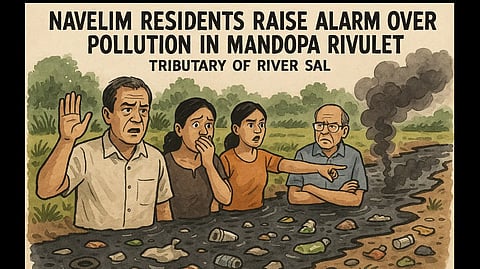

Residents of Na velim and environmental ists have voiced concerns over the worsening state of the Mandopa rivulet at Navelim, a tributary of the already polluted River Sal. The rivulet, once a vital natural water channel, now faces serious threats from unchecked dumping of gar bage, including non-biode gradable waste left behind after immersion processions. Locals say the problem is not new but has remained unresolved for years de spite repeated complaints. The fragile River Sal, of ten described as the life line of Salcete, has already reached a critical stage due to negligence, and its tributaries are bearing the brunt of careless waste dis posal. Highlighting the gravity of the issue, Carmo Car neiro told reporters that the matter was formally reported to the Navelim Village Panchayat and the biodiversity committee by the gavkari communities of Mandopa and Ravora. He explained that River Sal originates at Umbord lake in Verna and mean ders through Khareband, Navelim, Sirlim, Dramapur, Deussua and Orlim before merging with the Arabian Sea at Mobor-Betul. Along its course, it is fed by two tributaries—one beginning at Ghanttamo rod and passing through Jacknibhand, and another at Cuncolim. “This river system, which sustains life in Salcete, is dying. Pollu tion, garbage, and careless practices are accelerating its destruction,” Carneiro warned, appealing for ur gent intervention from the authorities. Responding to these con cerns, Navelim sarpanch Paul Pereira confirmed that the panchayat had already initiated cleaning works on the Mandopa rivulet from Monday. “We are taking this is sue very seriously. The panchayat has begun clear ing garbage from the water and nearby area. However, this is not just the respon sibility of the authorities. Citizens must also stop dumping waste, and I espe cially urge devotees to en sure that immersion rituals do not leave behind debris that damages the river and the environment,” Pereira said. Environmentalists stressed that mere clean up drives are not enough to protect the river sys tem. They have demanded a comprehensive waste management plan, stricter monitoring of immersion activities, and community participation to prevent the recurrence of such pol lution. Locals also want the government to recognise the ecological and cultural importance of River Sal and treat its preservation as a priority. For the people of Na velim, the Mandopa rivulet is more than just a water way—it is part of the life line that sustains agricul ture, fishing, and the village ecosystem. Residents now hope that the current atten tion will mark the begin ning of long-term solutions, not just temporary relief measures